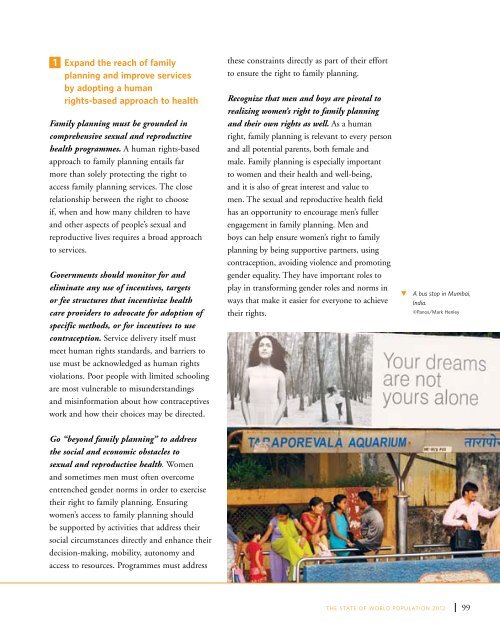State of World Population 2012 - Country Page List - UNFPA
State of World Population 2012 - Country Page List - UNFPA
State of World Population 2012 - Country Page List - UNFPA
You also want an ePaper? Increase the reach of your titles
YUMPU automatically turns print PDFs into web optimized ePapers that Google loves.
1 Expand the reach <strong>of</strong> family<br />
planning and improve services<br />
by adopting a human<br />
rights-based approach to health<br />
Family planning must be grounded in<br />
comprehensive sexual and reproductive<br />
health programmes. A human rights-based<br />
approach to family planning entails far<br />
more than solely protecting the right to<br />
access family planning services. The close<br />
relationship between the right to choose<br />
if, when and how many children to have<br />
and other aspects <strong>of</strong> people’s sexual and<br />
reproductive lives requires a broad approach<br />
to services.<br />
Governments should monitor for and<br />
eliminate any use <strong>of</strong> incentives, targets<br />
or fee structures that incentivize health<br />
care providers to advocate for adoption <strong>of</strong><br />
specific methods, or for incentives to use<br />
contraception. Service delivery itself must<br />
meet human rights standards, and barriers to<br />
use must be acknowledged as human rights<br />
violations. Poor people with limited schooling<br />
are most vulnerable to misunderstandings<br />
and misinformation about how contraceptives<br />
work and how their choices may be directed.<br />
these constraints directly as part <strong>of</strong> their effort<br />
to ensure the right to family planning.<br />
Recognize that men and boys are pivotal to<br />
realizing women’s right to family planning<br />
and their own rights as well. As a human<br />
right, family planning is relevant to every person<br />
and all potential parents, both female and<br />
male. Family planning is especially important<br />
to women and their health and well-being,<br />
and it is also <strong>of</strong> great interest and value to<br />
men. The sexual and reproductive health field<br />
has an opportunity to encourage men’s fuller<br />
engagement in family planning. Men and<br />
boys can help ensure women’s right to family<br />
planning by being supportive partners, using<br />
contraception, avoiding violence and promoting<br />
gender equality. They have important roles to<br />
play in transforming gender roles and norms in<br />
ways that make it easier for everyone to achieve<br />
their rights.<br />
t<br />
A bus stop in Mumbai,<br />
India.<br />
©Panos/Mark Henley<br />
Go “beyond family planning” to address<br />
the social and economic obstacles to<br />
sexual and reproductive health. Women<br />
and sometimes men must <strong>of</strong>ten overcome<br />
entrenched gender norms in order to exercise<br />
their right to family planning. Ensuring<br />
women’s access to family planning should<br />
be supported by activities that address their<br />
social circumstances directly and enhance their<br />
decision-making, mobility, autonomy and<br />
access to resources. Programmes must address<br />
THE STATE OF WORLD POPULATION <strong>2012</strong><br />
99
















